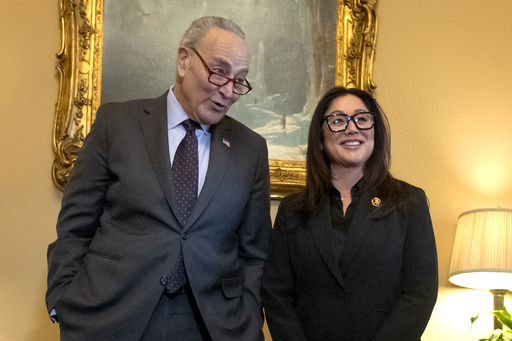
WASHINGTON — President Donald Trump has challenged Senate Republicans numerous times with his Cabinet nominations, but the selection of Lori Chavez-DeRemer for the position of labor secretary is proving particularly contentious.
Chavez-DeRemer, previously a congresswoman from Oregon, does not fit the mold of a conventional Republican candidate. She is the daughter of a long-time Teamsters member and is a small business owner and the former mayor of a suburb in the liberal area of Portland. During her time in the House, she supported legislation favored by labor unions, which likely influenced Trump’s decision to nominate her for the Labor Department. Her candidacy has disrupted traditional party lines, receiving support from some Democrats while raising eyebrows among many Republicans concerned about her pro-labor stance.
Trump, alongside his supporters, aims to upend the GOP’s historical aversion to unions in an effort to attract more voters from the Democratic base. “The party has changed,” remarked Sen. Markwayne Mullin, R-Okla., a supporter of Trump’s nominations, stating that Chavez-DeRemer embodies the new coalition of labor supporters drawn to the GOP.
However, opinions within the Republican Senate are divided, with some members opposing her nomination. Sen. Rand Paul of Kentucky criticized Chavez-DeRemer’s past backing of the PRO Act, citing concerns that it would undermine state laws that protect workers’ rights to refrain from joining unions. Despite his reservations, Paul anticipates a bipartisan confirmation for her nomination, predicting a mix of 15 Republican votes against her and around 25 Democratic votes in favor.
If confirmed, Chavez-DeRemer will face significant workplace challenges during a period of increased union organizing. The Labor Department has a wide scope, addressing issues like labor practices, remote work debates, and the implications of automation. While she has maintained a low profile leading up to her confirmation hearing, scheduled for Wednesday, Chavez-DeRemer has previously expressed her support for organized labor. As a member of Congress, she was known for engaging with union members and proudly advocated for union support in her campaigns.
“In my district, unions aren’t the enemy of small businesses, they’re a partner,” she highlighted in a campaign ad. Notably, during her tenure on the House subcommittee concerned with labor issues, Chavez-DeRemer often skipped hearings where her party colleagues criticized unions. “I expressed my willingness to challenge some of the prevailing views, and they accepted that,” she shared in an interview with the Northwest Labor Press.
Chavez-DeRemer has caught the attention of labor leaders. Randi Weingarten, the president of the American Federation of Teachers, has supported her nomination and expressed hope that Trump will empower her in a similar way to how Franklin D. Roosevelt empowered Francis Perkins, the first female labor secretary. “Already, anti-labor factions within the Republican Party are gearing up against her,” Weingarten noted, emphasizing the importance of labor rights and worker empowerment amidst her nomination.
Sean O’Brien, the president of the International Brotherhood of Teamsters, shares similar sentiments. He approached Mullin after last year’s election, proposing Chavez-DeRemer could bridge a gap with organized labor. Their collaboration culminated in pitching her nomination to Trump, demonstrating a shift in relations that seemed unlikely just a year ago. Mullin reflected on their unlikely partnership as they connected over shared interests beyond politics.
Trump’s efforts to connect with voters from traditionally union-heavy backgrounds have motivated this newly union-friendly direction. Various factions within the party agree that this move is pivotal as economic policies adapt to meet the needs of working-class constituents who feel abandoned by conventional GOP approaches. Abigail Ball, the executive director at the conservative think tank American Compass, noted a shift away from purely pro-business rhetoric to embracing a broader economic understanding influenced by the failures of globalization.
While reports indicated a favorable stance among Republican senators towards Chavez-DeRemer, her unconventional pick has been acknowledged. For instance, Senator Tommy Tuberville from Alabama admitted, “She voted for the PRO Act. I don’t like that. But I like her.” Meanwhile, Senator John Cornyn of Texas suggested that since Trump won the election, he is entitled to form his own team absent extreme circumstances, viewing Chavez-DeRemer as a reflection of the evolving GOP base consisting of more working-class voters.
Senator Josh Hawley from Missouri expressed optimism about Chavez-DeRemer’s understanding of labor needs, highlighting the demand for American jobs with fair wages. “We need more quality union jobs,” he asserted, indicating a belief that her experience aligns with the party’s shifting focus.
Overall, while the confirmation process is set to unfold, it signifies broader strategic movements within the Republican Party aimed at reinforcing connections with labor and adapting to new voter demographics.

